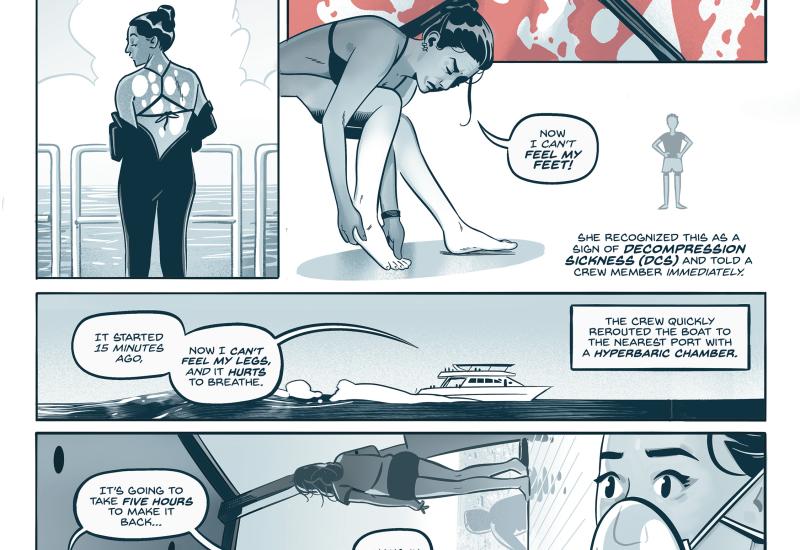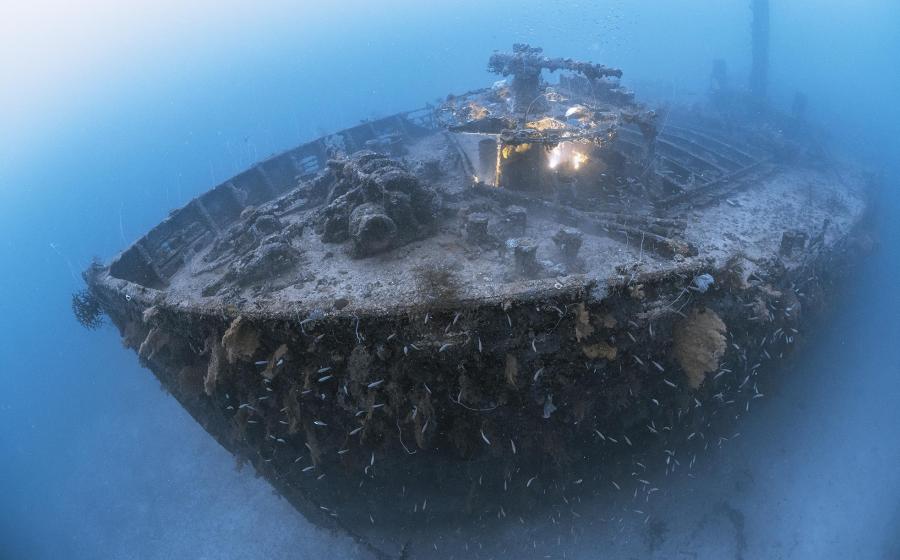Broken Rules, Bent Diver
May 2007
Exhausted and dizzy, Bill stumbled as he attempted to negotiate the narrow steps of the small commuter aircraft. Stopping to steady himself, he had to be assisted by a member of the flight crew to reach the tarmac. There was an incessant ringing in his ears and he had to stop several times to get his bearings on the short walk to the terminal building. Eventually, he made it to a taxi and then to his hotel where he slept for nearly 20 straight hours. When he awoke, the ringing in his ears was nearly deafening against the background of the quiet hotel room. Forcing himself from bed, Bill began to realize that he was suffering from decompression sickness.
The Diver
Bill was an advanced diver in his early 40s who was well traveled and very active in the sport. Every year he made several trips to the Caribbean, making dives on as many different islands as he could. He was in excellent health and had a solid understanding of the physics and physiology of diving.
The Trip
In his attempt to make a lot of dives on as many islands as possible, Bill scheduled a two-week excursion that had him hopping from island to island across the Caribbean. Diving no more than two days at any one location, he would then board a small plane, or in some cases a boat, to shuttle to the next island. He was logging two or three dives a day, including a number of dives deeper than 60 feet and a few dives deeper than 100 feet. A cautious diver, Bill never violated his computer's no-decompression limits and was careful to always make slow ascents. Although he did consume a moderate amount of alcohol each night, he also paid special attention to maintaining an adequate level of hydration during most of the trip. Bill knew that the number of flights, coupled with the amount of repetitive dives, was pushing the limits a bit, but he carefully scheduled a surface interval of at least 12 hours between dives and flights, and whenever possible, booked flights on small planes that maintained lower altitudes.
The Accident
Bill felt fine when he boarded the plane for an hour-long flight to an island he had never dived before. Midway through the flight, Bill suddenly felt tired. In spite of being well rested, he dozed off in his seat, waking just moments before the plane touched down. Initially, he thought the ringing in his ears was just noise from the aircraft and that the fatigue was the result of his vacation schedule catching up with him. Wisely deciding to forego the afternoon dives he had scheduled for the day, Bill thought rest would make him feel better. When he awoke the next morning, still extremely fatigued and plagued by the ringing in his ears, he knew that he was probably bent.
The island had no recompression chamber, so instead of seeking emergency oxygen from the dive shop or finding a local medical center, Bill opted to book an immediate flight home. As the plane gained altitude, his symptoms worsened, but Bill still did not seek immediate medical help when he arrived. Instead, he went home, cleaned his dive gear, and hoped that a good night's rest would resolve the symptoms. It did not. The next morning, Bill finally called a friend who was a trained dive medic to ask for advice. Following that advice, he immediately sought medical assistance and treatment for a neurological DCS hit. Although his fatigue and other symptoms were eventually alleviated by several chamber treatments, the tinnitus, or ringing in his ear, was persistent and remains to this day as a residual symptom of his bout with DCS.
Analysis
Bill's profiles and flights were all within the limits of the dive tables he was trained to use, and his DCS hit could be classified as an undeserved one. However, he did ignore his computer's time-to-fly advice on two occasions as well as the more conservative and widely held suggestion from medical experts to wait at least 24 hours before flying after repetitive dives. Bill's most egregious error, however, was failing to seek immediate treatment. Bill had dive insurance that would have covered him for low-altitude medical transport to the nearest recompression chamber where he could have been treated promptly after the initial onset of symptoms. Even after recognizing that he was probably bent, he delayed his treatment again by flying home. He is fortunate that the residual damage was not more severe.
Lessons for Life
Never push the tables. While dive tables and computer algorithms have a remarkable safety record, decompression theory is an uncertain science. Pushing the limits makes you more likely to be a statistical exception to the rules.
Wait 24 hours to fly. After multiple dives, deep dives or multiple days of diving, plan for a 24-hour surface interval between your last dive and any flights.
When in doubt, get checked out. If you think you may be bent, there is a good chance you are. Educate yourself about the symptoms of DCS and get evaluated immediately if you have them.
Don't wait. Every hour that you delay treatment in a recompression chamber increases your odds of permanent damage. If you are bent, get on oxygen immediately and get to a chamber as quickly as possible.
Don't fly when bent. Flying will only aggravate DCS as the reduced atmospheric pressure will cause damaging gas bubbles to expand even more.
Buy dive insurance and use it. Every active diver should purchase a good dive insurance policy that will help cover costs associated with evacuation and recompression treatment. If you have it, don't be afraid to use it.
May 2007
Exhausted and dizzy, Bill stumbled as he attempted to negotiate the narrow steps of the small commuter aircraft. Stopping to steady himself, he had to be assisted by a member of the flight crew to reach the tarmac. There was an incessant ringing in his ears and he had to stop several times to get his bearings on the short walk to the terminal building. Eventually, he made it to a taxi and then to his hotel where he slept for nearly 20 straight hours. When he awoke, the ringing in his ears was nearly deafening against the background of the quiet hotel room. Forcing himself from bed, Bill began to realize that he was suffering from decompression sickness.
The Diver
Bill was an advanced diver in his early 40s who was well traveled and very active in the sport. Every year he made several trips to the Caribbean, making dives on as many different islands as he could. He was in excellent health and had a solid understanding of the physics and physiology of diving.
The Trip
In his attempt to make a lot of dives on as many islands as possible, Bill scheduled a two-week excursion that had him hopping from island to island across the Caribbean. Diving no more than two days at any one location, he would then board a small plane, or in some cases a boat, to shuttle to the next island. He was logging two or three dives a day, including a number of dives deeper than 60 feet and a few dives deeper than 100 feet. A cautious diver, Bill never violated his computer's no-decompression limits and was careful to always make slow ascents. Although he did consume a moderate amount of alcohol each night, he also paid special attention to maintaining an adequate level of hydration during most of the trip. Bill knew that the number of flights, coupled with the amount of repetitive dives, was pushing the limits a bit, but he carefully scheduled a surface interval of at least 12 hours between dives and flights, and whenever possible, booked flights on small planes that maintained lower altitudes.
The Accident
Bill felt fine when he boarded the plane for an hour-long flight to an island he had never dived before. Midway through the flight, Bill suddenly felt tired. In spite of being well rested, he dozed off in his seat, waking just moments before the plane touched down. Initially, he thought the ringing in his ears was just noise from the aircraft and that the fatigue was the result of his vacation schedule catching up with him. Wisely deciding to forego the afternoon dives he had scheduled for the day, Bill thought rest would make him feel better. When he awoke the next morning, still extremely fatigued and plagued by the ringing in his ears, he knew that he was probably bent.
The island had no recompression chamber, so instead of seeking emergency oxygen from the dive shop or finding a local medical center, Bill opted to book an immediate flight home. As the plane gained altitude, his symptoms worsened, but Bill still did not seek immediate medical help when he arrived. Instead, he went home, cleaned his dive gear, and hoped that a good night's rest would resolve the symptoms. It did not. The next morning, Bill finally called a friend who was a trained dive medic to ask for advice. Following that advice, he immediately sought medical assistance and treatment for a neurological DCS hit. Although his fatigue and other symptoms were eventually alleviated by several chamber treatments, the tinnitus, or ringing in his ear, was persistent and remains to this day as a residual symptom of his bout with DCS.
Analysis
Bill's profiles and flights were all within the limits of the dive tables he was trained to use, and his DCS hit could be classified as an undeserved one. However, he did ignore his computer's time-to-fly advice on two occasions as well as the more conservative and widely held suggestion from medical experts to wait at least 24 hours before flying after repetitive dives. Bill's most egregious error, however, was failing to seek immediate treatment. Bill had dive insurance that would have covered him for low-altitude medical transport to the nearest recompression chamber where he could have been treated promptly after the initial onset of symptoms. Even after recognizing that he was probably bent, he delayed his treatment again by flying home. He is fortunate that the residual damage was not more severe.
Lessons for Life
Never push the tables. While dive tables and computer algorithms have a remarkable safety record, decompression theory is an uncertain science. Pushing the limits makes you more likely to be a statistical exception to the rules.
Wait 24 hours to fly. After multiple dives, deep dives or multiple days of diving, plan for a 24-hour surface interval between your last dive and any flights.
When in doubt, get checked out. If you think you may be bent, there is a good chance you are. Educate yourself about the symptoms of DCS and get evaluated immediately if you have them.
Don't wait. Every hour that you delay treatment in a recompression chamber increases your odds of permanent damage. If you are bent, get on oxygen immediately and get to a chamber as quickly as possible.
Don't fly when bent. Flying will only aggravate DCS as the reduced atmospheric pressure will cause damaging gas bubbles to expand even more.
Buy dive insurance and use it. Every active diver should purchase a good dive insurance policy that will help cover costs associated with evacuation and recompression treatment. If you have it, don't be afraid to use it.










